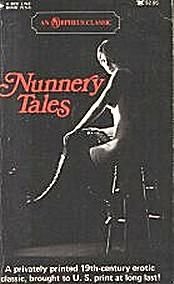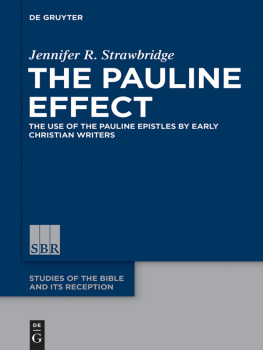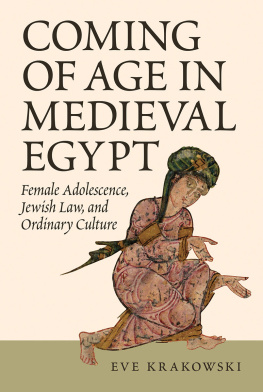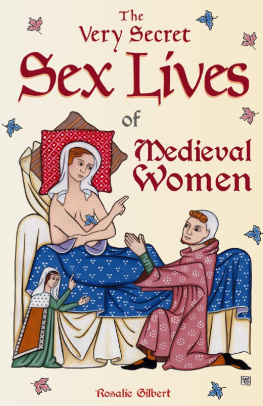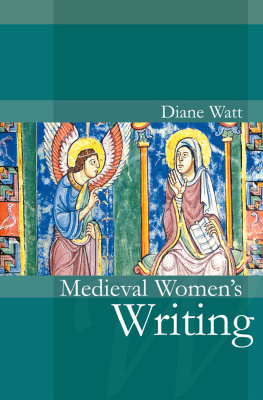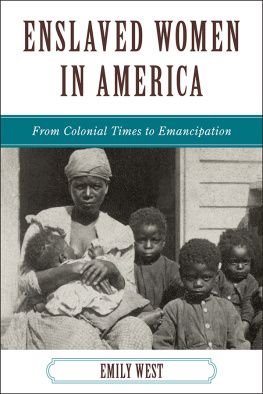ORDERING WOMENS LIVES
For my mother
in loving memory
Ordering Womens Lives
Penitentials and nunnery rules in the early medieval west
JULIE ANN SMITH
First published 2001 by Ashgate Publishing
Published 2016 by Routledge
2 Park Square, Milton Park, Abingdon, Oxon OX14 4RN
711 Third Avenue, New York, NY 10017, USA
Routledge is an imprint of the Taylor & Francis Group, an informa business
Copyright Julie Ann Smith 2001
All rights reserved. No part of this book may be reprinted or reproduced or utilised in any form or by any electronic, mechanical, or other means, now known or hereafter invented, including photocopying and recording, or in any information storage or retrieval system, without permission in writing from the publishers.
Notice:
Product or corporate names may be trademarks or registered trademarks, and are used only for identification and explanation without intent to infringe.
British Library Cataloguing in Publication Data
Smith, Julie Ann
Ordering womens lives : penitentials and nunnery rules in the early medieval West
1.Penitentials - History - To 1500 2.Convents - History - To 1500 3.Women - Religious life
I.Title
271.9'0009
Library of Congress Control Number: 2001091606
ISBN 13: 978-1-85928-238-0 (hbk)
ISBN 13: 978-1-138-27232-3 (pbk)
Contents
Two people have provided important contributions to my personal, intellectual, and spiritual development during the writing of this work. I have been inspired by the commitment of Jo Ann McNamara to the study of the history of the Catholic nuns; without her work my own would have been less satisfactory, less convinced. The nature and breadth of my work has been nurtured by the intellectual rigour and commitment of Keith Richard Beattie.
My deepest thanks are due to Associate-Professor Margaret Tennant and Dr Keith Beattie who both gave of their precious time to read and comment on the work in its later stages. Their critiques were important for the final shaping and honing of the work and they both provided considerate support for the project.
I would like to thank the following:
The History Programme of Massey University for the support received for my research which started during a post-doctoral fellowship and has continued since my appointment.
Massey University Research Fund for assistance towards travel to the UK and research costs.
The staff of the British Library, the Cambridge University Library, the Bodleian, the Lambeth Palace Library, and the Massey University Library.
Mrs Kathleen Loncar for her invaluable assistance with translating some of the texts into readable English and for her helpful comments and notes on aspects of the texts.
Mrs Lynne Coates for formatting the work and for her impeccable attention to detail. Ms Sharon Cox for her careful preparation of the final copy.
ASC | Plummer, Charles and John Earle (1892), Two of the Saxon Chronicles, Parallel, Oxford: Clarendon. |
Bede, HE | Historia Ecclesiastica in Bede (1975), Venerabilis Bedae: Historiam Ecclesiasticam Gentis Anglorum, Historia Abbatum, Epistolam ad Egbertum, una cum Historia Abbatum Auctore Anonymo, Charles Plummer (ed.) Oxford: Clarendon. |
CCSL | Corpus Christianorum Series Latina. |
Gregory, History | Gregory of Tours (1988), The History of the Franks Lewis Thorpe trans. Harmondsworth: Penguin. |
Haddan and Stubbs, Councils | Haddan, A.W. and W. Stubbs (eds) (1964), Councils and Ecclesiastical Documents Relating to Great Britain and Ireland, 3 vols. Oxford. |
McNamara, Sisters in Arms | McNamara, Jo Ann (1996), Sisters in Arms: Catholic Nuns through Two Millennia, Cambridge, MA: Harvard University Press. |
McNeill and Gamer, Handbooks | McNeill, J.T. and Gamer, H.M. (1990), Medieval Handbooks of Penance: a Translation of the Principal Libri Poenitentiales, New York: Columbia U.P. |
MGH, Conc. | Monumenta Germaniae Historia, Concilia. |
MGH, Epp. Selectae | Monumenta Germaniae Historia, Epistolae Selectae. |
MGH SS | Monumenta Germaniae Historia, Scriptores. |
PL | J.-P. Migne (ed.), Patrologia Cursus Completus, series latina. |
Schmitz, 1883 | Schmitz, H.J. (1883), Die Bussbucher und die Bussdisciplin de Kirche, Mainz: Kircheim. |
Schmitz, 1898 | Schmitz, H.J. (1898) Die Bussbucher und das Kanonische Bussverfahren, Dusseldorf: Schwann. |
SWDA | McNamara, Jo Ann et al, eds. and trans. (1992), Sainted Women of the Dark Ages, Durham: Duke University Press. |
Wasserschleben | Wasserschleben, F.W.H. ed. (1851), Die Bussordnungen der Abendlndischen Kirche nebst einer rechgeschichtlichen Einleitung, Halle: Graeger. |
This is a book about expectations which sanction modes of behaviour. It is a study of articulated norms for womens behaviour as devised by religious authorities in early medieval Europe. The study engages with a world which had both new and traditional elements and in which womens lives were governed by a variety of rules, norms, and expectations. The main influences came from two intersecting worlds, that is, from within the traditional cultural spheres of the post-migration folc and from the increasingly influential Christian Church whose clergy were endeavouring, with varying levels of success throughout the period, to overlay traditional practices and beliefs with their expectations. The ultimate aim of the clergy in this undertaking was to replace pre-Christian understandings and values with their salvific cosmos. To help them in this process the clergy employed a variety of methods for disseminating their expectations including such textual sources as sermons, doctrinal treatises, and conciliar canons. They infiltrated the law-giving process, firstly, through encouraging the newly-converted kings to write down their traditional laws, and then gradually remodelling these pre-Christian expectations to conform with Christian ideals. The penitentials and nunnery rules played a fundamental role in this Christianising process but their significance is increased for historians of womens experience by their potential for a closer proximity to the experiential worlds of a broad spectrum of women than that of such texts as the law codes and conciliar canons. Both the penitentials and nunnery rules, which were designed and written throughout the period with the express purpose of creating behavioural expectations for their audiences, are extremely useful for accessing the lives of early medieval women because they can be expected to have influenced a broad band of social degrees and economic statuses.


